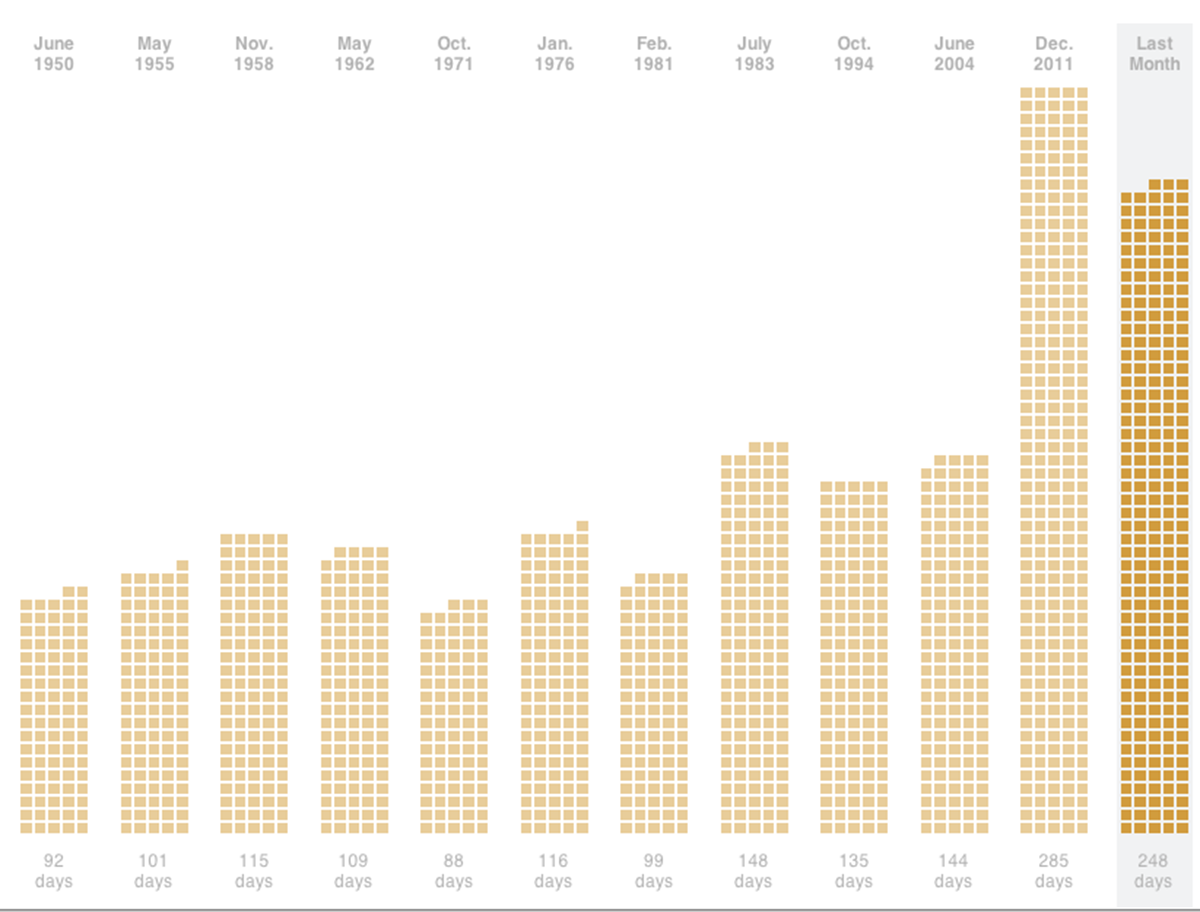According to this morning's jobs report, people who can't find full-time work have been unemployed for an average of almost 260 days. Below is a chart of post-recession peaks of unemployment since 1948, measured in days. ▢ = 1 day
According to this morning's jobs report, people who can't find full-time work have been unemployed for an average of 260 days. Below is a chart of the average duration of unemployment since 1948.
Since the recession, the typical unemployed American has been out of work for longer periods than at any other time since the Bureau of Labor Statistics started recording such data in 1948 — peaking in December 2011 with an average 40.8 consecutive weeks of joblessness. People who are unemployed for more than 27 weeks — also known as the long-term unemployed — make up more than a third of all job seekers. Long-term unemployment affects a wide range people, from blue-collar to white-collar workers, high-school dropouts to college graduates, young people who only just entered the job market to baby boomers who have worked in professions for decades, according to the White House.
Economists worry about the implications of long-term unemployment on the economy: workers can lose valuable skills over extended periods of joblessness, which can in turn affect the overall productivity of the nation. But long-term unemployment also has huge implications for individuals. The longer a person is unemployed the harder they can find itto find employment. They might also have to settle for a large drop from previous salaries to get a job. But more importantly, being out of work for so long can bring about depression, strain relationships and cause children in families struggling with unemployment to perform worse in school, research has shown.
Al Jazeera reached out to you to ask you about your stories behind your long bout of unemployment. Below are some of those testimonials. Use the form to submit your own story.
Age: 39 Location: Albion, Michigan Unemployed: between June 2010 and Sep. 2013
His story: Welker, a married father of two, spent years as a substitute teacher and youth counselor. After one contract with a local school ran out in the late 2000s and he couldn't find a full-time job, he spent three years taking on short-term jobs like scoring standardized tests or selling unwanted things for other people on eBay. He was recently gotten a full-time job as a programmer analyst, after enrolling in a community college program funded by the Department of Labor and aimed at educating qualified, out-of-work candidates in computer science.
Age: 45 Location: Rancho Santa Margarita City, California Unemployed since: Nov. 2012
His story: Bruce used to work in quality assurance in the inflight entertainment industry and was laid off a year and some months after his company downsized their staff by roughly 20 percent. After his unemployment benefits ran out, his wife became the sole breadwinner. The two struggle to pay their bills and will lose their home next Tuesday. A veteran who served in the Gulf War in the early 1990s, he is now hoping that the U.S. Department of Veterans Affairs will be able to assist him finding housing, while still applying for jobs.
Age: 50 Location: Athens, Georgia Unemployed since: May 2011
Her story: North, a graduate from Cornell University and University of Georgia, used to work as a brand strategist and then taught Spanish full-time at college. In 2011, her employer did not renew her teaching contract. She has been applying to various jobs ever since and gets by with the odd freelance project while living in her parents' second home.
Age: 28 Location: Le Mars, IA Unemployed since: N/A
His story: I worked several jobs before taking on a higher paying factory work. It was great at first, until the plant went under. I applied for every job imaginable. Finally just under a year later, I landed the job I am at now.
